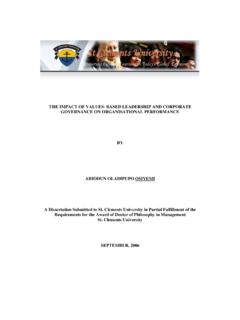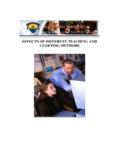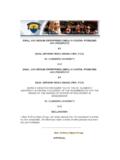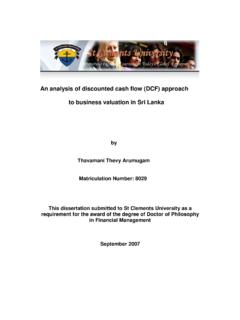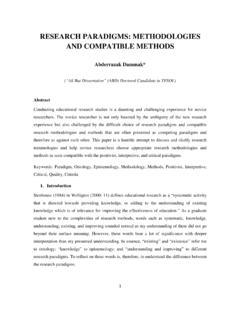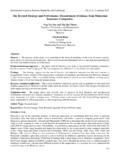Transcription of EMPLOYEE COUNSELLING PROGRAMS IN THE …
1 EMPLOYEE COUNSELLING PROGRAMS IN THE malaysian WORKPLACE by Peter Tong Hing Tham A dissertation submitted in partial fulfillment of the requirement for the degree of Doctor of Philosophy St. Clement University, British West Indies. September, 1998 i ABSTRACT The purpose of this dissertation is to examine the need of EMPLOYEE COUNSELLING PROGRAMS in the malaysian workplace and the key issues involved in the designing and promoting of such PROGRAMS . The dissertation covers the essential elements of EMPLOYEE COUNSELLING PROGRAMS and the appropriate steps needed to successfully implement the program. It also addresses the values and culture of the malaysian workforce that may affect the success of implementation of the PROGRAMS . The dissertation incorporated a study that was conducted on 102 employees from two companies in Malaysia to find out the attitudes towards COUNSELLING services and the types of problems commonly being experienced by the employees in the organisation.
2 The results indicated that the employees were positive toward the provision of COUNSELLING PROGRAMS in the company and that the main problems experienced were that of career, financial and health. The dissertation also included the recorded responses of employees to an existing EMPLOYEE COUNSELLING program in the National Bank of Malaysia. The findings support the results of the above-mentioned study. The dissertation will provide the conceptual framework upon which COUNSELLING PROGRAMS in the malaysian workplace are based, as well as the types of activities and skills that are involved. The focus is on such PROGRAMS that will help employees deal with personal or health problems that might affect their productivity. The dissertation will show that an EMPLOYEE COUNSELLING program can succeed only in the context of an organisational commitment to its goals. The successful PROGRAMS tend to be the one that is carefully planned, efficiently implemented, and well received by the people it has been designed to serve.
3 Ii DECLARATION I certify that this thesis does not incorporate without acknowledgement any material previously submitted for a degree or diploma in any university; and that to the best of my knowledge and belief it does not contain any material previously published or written by another person where due reference is not made in the text. _____ _____ Date Peter Tong Hing Tham iii ACKNOWLEDGEMENT Thanks are due to my mentor, Prof. Letticia Arbis, Mr. Sandhu and Ms. Teres of the Institute of Professional Financial Manager, and Mr. Lee Chee Loi, the former Senior Vice President of the Group Human Resources Division, MBf Management Sdn Bhd for the interest, assistance and support given in the preparation of this thesis. vi LIST OF TABLES Table Page Difference in attitudes towards COUNSELLING 28 by gender 2 Difference in attitudes towards COUNSELLING 29 by ethnicity 3 Difference in attitudes towards COUNSELLING 29 by job categories v TABLE OF CONTENTS Page ABSTRACT i DECLARATION ii ACKNOWLEDGEMENT iii LIST OF TABLES vi Chapter 1 THE PROBLEM AND ITS BACKGROUND 1 2 RELATED LITERATURE AND STUDIES 10 3 METHODOLGY 22 4 PRESENTATION AND INTERPRETATION OF DATA 28 5 SUMMARY OF FINDINGS AND RECOMMENDATIONS 34 REFERENCES 45 APPENDIX A.
4 QUESTIONNAIRE 47 Chaper 1 THE PROBLEM AND ITS BACKGROUND Introduction The Importance of Developing and Preserving Human Resources COUNSELLING PROGRAMS geared specifically for employees in or near their work settings have grown steadily in recent years in Malaysia, primarily because employers have come to recognise the importance of developing and preserving valuable human resources. Managers have begun to listen to the ideas of people like Peters and Waterman, whose best-selling book on corporate excellence exhorts, Treat people as adults. Treat them as partners: treat them with dignity; treat them with respect. Treat them - not capital spending and automation - as the primary source of productivity In other words, if you want productivity and the financial reward that goes with it, you must treat your workers as your most important asset (1982). Two major categories of EMPLOYEE COUNSELLING In general , COUNSELLING services for employees can be divided into two major categories, namely, those dealing with personal problems and those dealing with career development.
5 The EMPLOYEE COUNSELLING PROGRAMS that deal with personal problems will focus on employees mental and physical health and deal with personal problems that might, even indirectly, affect job performance. Those that deal with career development PROGRAMS will use assessment, COUNSELLING , planning, and training to help individuals make and act on career decisions within the context of the organisation s human resources plans. Each of the two approaches is built on the theory that individual and organisational needs can be compatible (Lewis & Lewis, 1986). Background of the Study It is estimated that Malaysia, in experiencing an astounding pace of development and as it maintains its current growth rate of per annum, will become an industrialised nation in the year 2020. However, being part of an emerging industrialised nation, the malaysian workforce is already suffering from some of the ills that have befallen developed countries, such as an increased rate of family violence, divorce and stress-related illnesses.
6 The malaysian Government had been fully aware of the effects that had taken toll upon the malaysian workforce. This was evidenced by the speech made by Tan Sri Dato Seri Ahmad Sarji Bin Abdul Hamid, the Chief Secretary to the State in 6th Convention of the COUNSELLING Association of Malaysia in 1993, Generally, in any organisation an average of about 10% of the employees are incapacitated by acute or chronic personal problems such as family and marital problems, financial difficulties, legal problems, drug and alcohol abuse, emotional upsets or career problems. All these will affect work performance. Studies also show that employees have three times as many accidents, four times the rate of absenteeism, make more health insurance claims and more likely to make mistakes at their work and take more sick leave, under such circumstances. All in all, this will add on to the loss of work time and productivity for the organisation.
7 This in fact constitutes the major loss of work time rather than industrial action. The Chief Secretary went on to say that EMPLOYEE COUNSELLING was to be a major activity in the promotion of EMPLOYEE development. He stressed that supervisors and managers should be engaged in formal COUNSELLING sessions for the purpose of handling grievances, dealing with discipline matters, improving performance, disseminating information about benefits, policies and procedures, and helping employees in career development. It is therefore evident that there is a real need for EMPLOYEE COUNSELLING PROGRAMS to be implemented in the workplace to address the various social and psychological problems being faced by the malaysian workforce. This is supported by the fact that the demand for COUNSELLING services in corporate settings in Malaysia has been growing steadily in recent years. Some of the larger corporations had already initiated either partial or full fledge COUNSELLING PROGRAMS based in the workplace and were designed to deal EMPLOYEE s personal or career concerns.
8 They have come to recognise the importance of developing and preserving valuable human resources. The Origin of EMPLOYEE COUNSELLING PROGRAMS in Malaysia In a broad sense, EMPLOYEE COUNSELLING PROGRAMS in Malaysia had its small beginning in the settings of the churches, social work centers or non-governmental organisations in the early eighties. These were the centres that offered COUNSELLING to the public as a free service. However, the ever increasing problems on drugs, alcoholism, broken relationships, families and other social ills then have prompted the malaysian Government to give serious attention to the lack of professional COUNSELLING centers for the public at large. By the late eighties, there were concerted effort on the part of the Government to set up more COUNSELLING centers in the public sector to help its workers deal with problems. It was reported at one stage that the malaysian Social Welfare Ministry was sending many of its officers abroad to be trained as counsellors to meet the gigantic need for COUNSELLING .
9 It was only in the early nineties that certain private sector firms began to introduce professional industrial COUNSELLING to its EMPLOYEE as they realised that COUNSELLING have proven to be effective in not only reducing social problems, but also improving EMPLOYEE productivity that can run into millions of dollars in cost savings. However, it cannot be denied that in Malaysia, the EMPLOYEE COUNSELLING PROGRAMS are at an initial stage in a gradually evolving field designed to meet the needs of problem employees. Little as yet is known about the effectiveness and the design of the PROGRAMS . It is therefore important at this juncture, to take a closer look at what an EMPLOYEE COUNSELLING program is? Objectives of this study This study aimed to : 1. study the benefits of EMPLOYEE COUNSELLING PROGRAMS in Malaysia 2. examine the essential elements necessary for the successful implementation of EMPLOYEE COUNSELLING PROGRAMS in Malaysia taking into consideration the culture and custom of the people.
10 3. suggest some appropriate strategies in designing a successful EMPLOYEE COUNSELLING PROGRAMS for the malaysian workforce. Specific Objectives Essentially this study sought to deal with the following issues: 1. The benefits that the EMPLOYEE COUNSELLING PROGRAMS can offer to both the corporations and the workforce in Malaysia. 2. The openness the employees in Malaysia have towards to the COUNSELLING services being offered. 3. The essential components of EMPLOYEE COUNSELLING PROGRAMS in Malaysia. 4. The cultural issues relating to COUNSELLING on the job. 5. The barriers (or problems) encountered in the PROGRAMS implementation and the ways to overcome them. 6. The appropriate steps needed to successfully implement the PROGRAMS . Significance of the study This study provides the conceptual framework upon which COUNSELLING PROGRAMS in the malaysian workplace are based, as well as the types of activities and skills that are involved.
